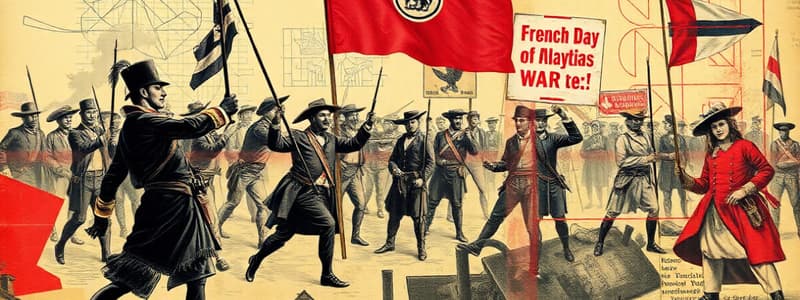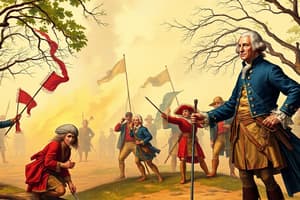Podcast
Questions and Answers
What was the primary result of the French and Indian War for Britain?
What was the primary result of the French and Indian War for Britain?
- Stronger alliances with Native Americans
- Significant financial debt (correct)
- Gaining independence from France
- Loss of territory in North America
What was the purpose of the Proclamation of 1763?
What was the purpose of the Proclamation of 1763?
- To ban the importation of British goods
- To stabilize relations with Native Americans (correct)
- To promote westward expansion by colonists
- To create new trade routes with France
What did the Stamp Act of 1765 require from the colonists?
What did the Stamp Act of 1765 require from the colonists?
- To buy specially stamped paper for documents (correct)
- To provide shelter for British soldiers
- To pay taxes on imported goods
- To volunteer for militia service
Which group was formed to protest against the Stamp Act?
Which group was formed to protest against the Stamp Act?
What event is known as the Boston Massacre?
What event is known as the Boston Massacre?
What significant action was taken by colonists during the Boston Tea Party?
What significant action was taken by colonists during the Boston Tea Party?
Why was the First Continental Congress convened in September 1774?
Why was the First Continental Congress convened in September 1774?
What was a common form of colonial resistance against British taxation?
What was a common form of colonial resistance against British taxation?
Which act allowed the British East India Company to sell tea at reduced prices, provoking the Boston Tea Party?
Which act allowed the British East India Company to sell tea at reduced prices, provoking the Boston Tea Party?
Who was a prominent figure killed during the Boston Massacre that symbolized colonial resistance?
Who was a prominent figure killed during the Boston Massacre that symbolized colonial resistance?
What was a direct outcome of the Boston Massacre?
What was a direct outcome of the Boston Massacre?
Which individual is often recognized as the first martyr of the American Revolution due to the Boston Massacre?
Which individual is often recognized as the first martyr of the American Revolution due to the Boston Massacre?
What was the primary purpose of the Proclamation of 1763?
What was the primary purpose of the Proclamation of 1763?
Which reaction did colonists have towards the Proclamation of 1763?
Which reaction did colonists have towards the Proclamation of 1763?
How did Patriot leaders like Paul Revere use the Boston Massacre as a tool?
How did Patriot leaders like Paul Revere use the Boston Massacre as a tool?
What did the Proclamation of 1763 require of colonists wishing to settle west of the Appalachian Mountains?
What did the Proclamation of 1763 require of colonists wishing to settle west of the Appalachian Mountains?
In what way did the Boston Massacre contribute to the Revolutionary War?
In what way did the Boston Massacre contribute to the Revolutionary War?
Which of the following best describes the significance of the Boston Massacre?
Which of the following best describes the significance of the Boston Massacre?
Study Notes
French and Indian War
- Fought from 1754 to 1763 between British colonies and French with Native American allies.
- Resulted in British victory, expanding their territory in North America.
- Left Britain with significant debt, prompting increased taxation of the colonies.
Proclamation of 1763
- Issued by King George III, it prohibited colonial settlement west of the Appalachian Mountains.
- Aimed to stabilize relations with Native Americans but angered colonists seeking westward expansion.
Stamp Act
- Passed in 1765; required colonists to buy special stamped paper for legal documents, newspapers, and other publications.
- Provoked widespread outrage and led to the formation of the Sons of Liberty.
- Repealed in 1766 due to colonial resistance.
Colonial Resistance
- Colonists organized protests and boycotts against British taxes and policies.
- The Non-Importation Agreements restricted British goods.
- Formed groups like the Sons of Liberty and Daughters of Liberty to coordinate resistance.
Boston Massacre
- Occurred on March 5, 1770; confrontation between British soldiers and Boston citizens.
- Five colonists killed, including Crispus Attucks.
- Used as a propaganda tool by revolutionaries to fuel anti-British sentiment.
Boston Tea Party
- Protest against the Tea Act of 1773, allowing British East India Company to sell tea at reduced prices.
- On December 16, 1773, colonists, disguised as Mohawk Indians, dumped 342 chests of tea into Boston Harbor.
- Resulted in punitive measures by Britain, exemplified by the Intolerable Acts.
First Continental Congress
- Convened in September 1774 in response to the Intolerable Acts.
- Delegates from 12 of 13 colonies (except Georgia) met to coordinate response to British policies.
- Issued the Declaration of Rights and Grievances and agreed to boycott British goods until their demands were met.
French and Indian War
-
Fought from 1754 to 1763, the war involved British colonies and French forces with their respective Native American allies.
-
The British victory resulted in a significant expansion of their territory in North America.
-
The war left Britain with substantial debt, leading to increased taxation on the colonies.
Proclamation of 1763
-
Issued by King George III, the Proclamation prohibited colonial settlement west of the Appalachian Mountains.
-
The intention was to improve relations with Native Americans, but it angered colonists seeking westward expansion.
Stamp Act
-
Passed in 1765, the Stamp Act required colonists to purchase special stamped paper for various documents, including legal documents, newspapers, and publications.
-
The Act sparked widespread protests and led to the formation of the Sons of Liberty, a group dedicated to resisting British policies.
-
The significant colonial resistance ultimately forced the repeal of the Stamp Act in 1766.
Colonial Resistance
-
Colonists employed a variety of tactics in their resistance against British taxes and policies.
-
They organized protests, boycotts, and implemented Non-Importation Agreements to restrict British goods coming into the colonies.
-
Groups like the Sons of Liberty and Daughters of Liberty coordinated resistance efforts.
Boston Massacre
-
On March 5, 1770, a confrontation between British soldiers and Boston citizens resulted in the Boston Massacre.
-
Five colonists were killed, including Crispus Attucks, a prominent figure in resistance movements.
-
The incident was used by revolutionaries to fuel anti-British sentiment and portray British troops as violent and oppressive.
Boston Tea Party
-
The Boston Tea Party was a protest against the Tea Act of 1773, which granted the British East India Company a monopoly on tea sales, lowering prices but creating unfair competition for colonial merchants.
-
On December 16, 1773, colonists disguised as Mohawk Indians boarded ships and dumped 342 chests of tea into Boston Harbor.
-
This act of defiance resulted in retaliatory measures from Britain, which implemented the Intolerable Acts.
First Continental Congress
-
The First Continental Congress convened in September 1774 in response to the Intolerable Acts.
-
Delegates from 12 of the 13 colonies (except Georgia) met to formulate a unified response to British policies.
-
They issued the Declaration of Rights and Grievances, outlining colonial grievances, and agreed to boycott British goods until their demands were met.
Boston Massacre
- The Boston Massacre took place on March 5, 1770.
- Rising tensions between British authorities and American colonists were a key factor leading to the massacre.
- British soldiers opened fire on a crowd of colonists protesting against British presence and policies, resulting in the deaths of five colonists.
- Crispus Attucks, often considered the first martyr of the Revolution, was among the victims.
- The Boston Massacre fueled anti-British sentiment and was used as propaganda by Patriot leaders.
- The incident highlighted the dangers of British military presence in colonial cities.
Proclamation of 1763
- King George III issued the Proclamation of 1763 after the French and Indian War.
- The proclamation aimed to prevent colonial westward expansion beyond the Appalachian Mountains, in an effort to stabilize relations with Native Americans.
- The proclamation restricted colonial settlement west of the proclamation line and required colonists to obtain royal permission for westward expansion.
- Colonists reacted with resentment and anger, viewing the proclamation as an infringement on their rights and expansion aspirations.
- The Proclamation of 1763 contributed to growing discontent with British rule and fueled aspirations for self-governance, ultimately setting the stage for future conflicts leading to the Revolutionary War.
Studying That Suits You
Use AI to generate personalized quizzes and flashcards to suit your learning preferences.
Description
Explore key events and policies that shaped colonial America following the French and Indian War. This quiz covers the Proclamation of 1763, the Stamp Act, and various forms of colonial resistance against British imperial rule. Test your understanding of how these historical moments influenced the path to American independence.





